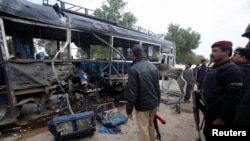ISLAMABAD —
Pakistan on Friday ended a second formal round of talks with Taliban insurgents with a warning that continued violence in the country threatened the peace dialogue. Analysts debate whether a deal with the militants will end the bloodshed in Pakistan.
It was a short meeting behind closed doors that ended with a clear statement from the government: the Taliban had to end its attacks or the peace talks would suffer.
The government negotiating team was referring to a spate of bombings in the southern city of Karachi that has left at least a dozen dead, and more injured.
In a joint statement released after the meeting, the Taliban said it regretted the violence, but added the government should also immediately stop all its anti-terrorist operations.
Taliban representative Maulana Sami-ul Haq said the two sides would continue to work towards peace.
“We will overcome these obstacles that are in our way. Our first efforts should be aimed at ensuring that neither side acts in such a way that would upset the other. In the statement, we say that we regret all anti-peace actions,” said Sami-ul Haq.
A suicide bomber targeting security forces in Karachi blew himself up on Friday, the latest in a string of attacks in the city.
The Taliban claimed responsibility for a deadly bombing there on Thursday that claimed at least 11 lives.
Previous peace pacts with the insurgents have failed.
But even if the current round of talks are successful, Muhammad Amir Rana of the Pakistan Institute for Peace Studies, cautions it will not guarantee an end to the violence.
“We have the Islamist militants operating in tribal areas," he said, "they have their affiliates in other parts of the country, we have the sectarian groups, we have the Baloch nationalists, and we have the diverse conflict landscape of Karachi where, not only the military, sectarian groups are active, but ethnic and criminal gangs are active.”
Rana says rather than focus on the Taliban, the government of Prime Minister Nawaz Sharif must develop a national comprehensive approach to security.
It was a short meeting behind closed doors that ended with a clear statement from the government: the Taliban had to end its attacks or the peace talks would suffer.
The government negotiating team was referring to a spate of bombings in the southern city of Karachi that has left at least a dozen dead, and more injured.
In a joint statement released after the meeting, the Taliban said it regretted the violence, but added the government should also immediately stop all its anti-terrorist operations.
Taliban representative Maulana Sami-ul Haq said the two sides would continue to work towards peace.
“We will overcome these obstacles that are in our way. Our first efforts should be aimed at ensuring that neither side acts in such a way that would upset the other. In the statement, we say that we regret all anti-peace actions,” said Sami-ul Haq.
A suicide bomber targeting security forces in Karachi blew himself up on Friday, the latest in a string of attacks in the city.
The Taliban claimed responsibility for a deadly bombing there on Thursday that claimed at least 11 lives.
Previous peace pacts with the insurgents have failed.
But even if the current round of talks are successful, Muhammad Amir Rana of the Pakistan Institute for Peace Studies, cautions it will not guarantee an end to the violence.
“We have the Islamist militants operating in tribal areas," he said, "they have their affiliates in other parts of the country, we have the sectarian groups, we have the Baloch nationalists, and we have the diverse conflict landscape of Karachi where, not only the military, sectarian groups are active, but ethnic and criminal gangs are active.”
Rana says rather than focus on the Taliban, the government of Prime Minister Nawaz Sharif must develop a national comprehensive approach to security.





